- Home
- Steven Becker
Wood's Fury Page 9
Wood's Fury Read online
Page 9
Thirteen
Passing the lobster boat on the port side, Mac stared at the figure tossing his lunch over the side. It was an unusual enough sight on this type of boat that he watched the man for a long minute until they disappeared around the bend and entered the cove. He looked familiar but as the guy was sitting on the opposite side of the boat with his head facing away, Mac couldn’t place the man.
Ahead, the smoke was thick and black. Streams of water sprayed from the half-a-dozen fire engines seemed to be having little effect on the blaze aside from keeping it from spreading. As he watched, Mac wondered if there was more than seafood fueling the inferno.
Entering the small inlet to the cove, he pulled alongside several lobster boats. Several of the men looked familiar, but Mac was bad with names. Mac had been worried about being visible in Trufante’s center console, but with its former bright whites now faded to yellow and its second registration number, it was easily identified as a commercial boat. It turned out that he needn’t have worried, as Trufante waved at one of the men. Commercial fishermen were a tight-knit band, and though Mac stayed aloof and removed from the group, for better or worse, the Cajun knew them all.
“Bring her in over there,” Trufante pointed to two pilings that outlined an empty slip.
Mac pushed the boat forward until the angle was right, and backed in between the pilings. Nudging the bow toward the starboard side, he allowed Trufante to grab the line looped over the outside pile. Once it was looped around the bow cleat, Mac inched backwards while Trufante released line. When the transom was a foot away from the concrete seawall, Mac raised a fist, called out to Trufante, and killed the engines. Trufante cinched off the line and the boat stopped.
“You want the port line?” Trufante called back from the bow.
Right now the tide was incoming, and Mac didn’t expect to be there long enough to have to worry about it changing. Looking ahead, he saw the starboard side bow-line was tight and holding them in the center of the slip.
“Go ask them what they know,” he told Trufante. “Then, if you’re sober enough, you can tell me why the hell we’re here and why the warehouse is on fire.”
Dodging the questions, the Cajun swung one leg onto the seawall and, using the stern line, pulled himself up. Mac eyed him as he walked to the group of men watching the fire. They greeted Trufante warmly and they started talking, though Mac did see several not-so-friendly glances tossed his way. He waited patiently. Fishermen were gossips, and Mac could use all the information he could get. Until Trufante accepted the inevitable offer of a beer, Mac would let him talk.
Turning away from the dock, he stared across the water at the fire consuming the fishmonger’s facility. The firefighters seemed to be making progress, and slowly the flames were fading, leaving only smoke. Studying the crowd on both sides of the crime-scene tape placed to keep the public at a safe distance, he saw no sign of the owner.
“Hey.” Mac called toward Trufante, who was just about to accept an offered beer. He looked back at Mac, shook his head, bumped fists, and said goodbye to the men.
“Damn, Mac, get a few beers in ’em and you never know what they’re going to tell you.”
“Never mind that,” There was nothing more to be accomplished here, and Mac held the stern line, ready to release it. “What do they know?”
“JC hightailed it out of here on that boat we passed coming in.”
Trufante, in his drug-induced state, had withheld that bit of information long enough for JC to escape. Mac turned away in disgust, released the line, and went to the helm. He called to Trufante to release the stern line, and, pulling forward out of the slip, turned to starboard and left the inlet.
Mac cringed when he saw a police boat stationed at the entrance to the channel to keep boat traffic away. Again, being aboard a commercial boat paid dividends when the officer waved, allowing them to leave. Mac kept an eye on him anyway. He was probably there to keep the news channels and disaster tourists away, but Mac was sure he saw him writing down the registration number as they passed. Though they had only stopped for a minute to gather information, it was another record of him being in the wrong place at the wrong time. Fortunately, the officer showed no sign of recognizing him—or Trufante.
Mac was silent as he ran through the channel. When he reached the last marker, he turned to starboard, and felt Mel at his side.
She looked ahead at the empty water. “You’ll never catch him.”
“Unless he headed for the Bahamas, there aren’t too many places he’d go.”
Mel looked down at the chartplotter and ran her finger along the endless channels laced between mangrove banks to the east. “Anywhere in here, and he could disappear.”
Mac knew the area well. Since the Spanish had discovered gold in the Americas, the area of the Lower Keys that Mel had pointed to had hidden the likes of Blackbeard and his contemporaries, gunrunners, smugglers, and drug dealers. He wouldn’t be surprised if someone found a German U-boat in there. But JC was not that kind of guy.
“He won’t hide. I don’t know him well, but I know his kind.”
“You think he’ll go after whoever started the fire?” she asked.
“I do, and not for the money. Guys like him have enough enemies to be insured to the hilt. He’ll want revenge.” Mac steered slightly to the south and offshore to avoid the shallows off the ocean side of Key West.
“This can’t be a coincidence.” Mel stated the obvious.
Just as she said it, Mac saw a lobster boat coming toward them. He attempted to hail it on channel 16, as he usually did, but the other captain either didn’t answer or had his radio off.
“Tru, you know that guy?”
Trufante rose with purpose, like he could redeem himself through identifying the other boat. Shielding his eyes from the sun, he studied the approaching vessel. “Rusty.”
“Got his number?” Mac asked.
Trufante pulled his phone out of his pocket and scrolled through his contacts. “Right here.”
“Text him to stop. I’d like to talk to him.” Mac paused. “But don’t use my name.” Mac knew he was an outlier, and that there was animosity between him and some of the other fishermen who had to scrape by to make a living.
Trufante pecked out a message and hit send. Mac could only hope Rusty had his phone on vibrate. He expected he did out of habit. Cell phones, at least until the limits of their reception were reached, had revolutionized fishing. Before they became popular, the only way to contact another fishermen was over the public airways using VHF or SSB. They had used random channels and codes, but anyone listening had access to their information. Mac glanced over at the screen of Trufante’s phone, but it remained blank.
Though Rusty hadn’t answered, the approaching boat responded, changing course and slowing. A few minutes later, the boats were alongside each other.
“Toss the fenders,” Mac called to Trufante.
“No need for that, Travis. Won’t be staying long. If I would have known it was you, I might have kept going.”
Mac had nothing to lose. “Was that JC on your boat just now coming out of the marina?”
“I don’t know no JC,” Rusty spat, and accelerated away.
That answered the question. Mac called out to Mel and Pamela to brace themselves, and grabbed the wheel while the wake from Rusty’s boat passed under the center console. When they stopped swaying, he turned to Trufante.
“Where would he have taken him?”
“Dude’s into this Santeria business. If it was me, and my place got torched, I’d be looking for my priest.”
JC walked down the concrete pier. The ocean-facing south side of Key West was riddled with shallows, making the pier, an extension of White Street that spanned hundreds of feet over the flats, the only safe place for Rusty to put him ashore. Even then, there was only the eastern edge that was accessible.
Leaving the sidewalk, he cut across the white-sand beach, and stepped through the decorated m
onument pedestals marking the African Refugee Cemetery. In the center of the mosaic inlaid into the concrete base stood his priestess.
She was a tall woman made to look even more so by the dreadlocks coiled high on her head like a snake’s nest. She wore a traditional African kanga, and was, as always, barefoot. Her face was unmarked, tattoos being against her odu, and behind round glasses her eyes were a brilliant green. In her mouth was an unlit cigar.
“Goddamned son of a bitch, go to hell …” JC started, but stopped when the woman looked down at him. He knew better than to swear in front of her, but he was at the end of his rope. His offerings had been ignored.
“Watch your mouth. Just because the gods are against you today doesn’t mean you disrespect them.”
“What can I do to gain their favor?”
Low and under her breath, she started to chant. The sound was too soft for JC to hear, but if she was communing with the gods on his behalf, he would set his impatience and foul mood aside.
“The offerings are not enough.”
His stomach dropped. “If the gods wouldn’t accept my thanks, what am I to do?”
“Whatever you are doing to anger them, you must stop—”
He grunted, cutting her off.
Looking down her nose at him, she continued. “But there is another way.”
He met her gaze. “Anything.”
“Get two chickens and bring them here at sunset.”
He’d heard of animal sacrifices to the gods, but thought it was just rumor. “Really?”
“You silly little man.” She turned to walk away.
“Okay. I’ll be here.”
She looked back. “My fee as well. Doubled.”
JC waited until she left the memorial, then started toward White Street. He had no idea where she was going, where she lived, or what she did with her time, and didn’t care. With only a few hours of daylight left, he had two chickens to find.
You didn’t have to look far to find chickens in Key West. The feral “gypsy” chickens, as they are known, are as much of a favorite among tourists as they are a bane to residents. Like the cats that match their numbers, they are wary and virtually uncatchable. Several years ago, he’d had a run-in with the law after trying to shoot some on his property, and through that experience, discovered the Key West Wildlife Center. The facility offered traps and accepted the chickens, which were then shipped upstate to friendly farms where they were used for bug control. He knew he could find his chickens there, and it happened to be just across the street.
Crossing Atlantic Boulevard often involved a short sprint across the busy four-lane road. In his sweat-soaked boots it would be difficult. Taking a few minutes, he found a bench by the pier, sat down, and took off his boots. Regretting it the second they were off his feet and their odor was freed, he dumped the water out and put them back on. Before he stood up, something caught his eye on the water.
A fishing boat was cruising past, not an unusual sight, but JC knew every local fishermen and their craft. Rather than offload their catch into coolers and haul them over to the fish house by truck, most preferred to use his dock to drop off their catch. He could instantly tell this was a commercial boat, but not a local.
From this distance it was difficult to see the people aboard, but Trufante stood out in a crowd, and JC immediately identified him. At the wheel was another man, who considering the association, he guessed to be Mac Travis. With another enemy now in Key West, he thought it might be wise to get a few more chickens to sacrifice.
Fourteen
Sloan swatted a mosquito brave enough to land on his nose, and flexed his cramped muscles as he watched his inheritance burn to the ground. Nestled deep in a mangrove patch, and further concealed by a pile of crab traps, he squatted down, and watched the firefighters work.
He tried to relax his muscles to relieve the debilitating cramps, cursing Dr. Johnnie’s fake cure-all, but he was scared to move. It had been a mad dash to the warehouse after Trufante had spoken his father’s name. When his friends’ accomplices entered the treatment room, he had followed Dr. Johnnie, exited through a back door, and caught a cab. On the ten-minute ride over to Stock Island, he had formulated his plan.
Looking at his handiwork, he doubted an experienced arsonist could have done much better. With all the boats around, there had been no lack of gasoline to use as an accelerant. Rather than paying the dollar-per-gallon premium the marinas charged, fishermen generally hauled their fuel in ten-gallon containers that they filled at the gas station. Grabbing two of the readily available containers, he had spread the gas along the perimeter of the building. He hadn’t meant to destroy the building, only to smoke out his old man. The destruction was impressive, and there was a certain thrill in watching his father’s business burn, but he had to put that aside—he was no closer to finding the drugs.
He had to remind himself that this was not really about his father. Once he saw the old pickup parked in its usual space, his intention merely had been to flush the old man out. The warehouse was JC’s domain, and, confident that he would stash the drugs there, Sloan had started the fire hoping to evacuate the premises, allowing him to slip in and search it. The plan had worked, but what he hadn’t realized was the Fire Department had a station less than a mile away. Minutes after the smoke set off the alarm, the access road, the only way out, was blocked by a slew of emergency vehicles.
Just as the first stream of water was shot onto the blaze, he watched as his father pushed a rubberized wheelbarrow, one of the several kept along the dock, across the parking lot. From his hiding spot, he could easily see the bright-red dry bags filled with his drugs, but between the first responders and the barren landscape surrounding the building and docks, he had no choice but to stay put. Minutes later, he watched as the packages were loaded aboard a lobster boat, and both the cocaine and his father headed out of the small marina.
Looking around for an escape, he tried to come up with a convincing story of why he was here. Even after an hour, there was clearly a lingering odor of gasoline on his clothes. If he could smell it himself, there was no chance the trained firefighters would miss it.
Pulling out his phone, he opened Google Earth and studied his options. The satellite image only confirmed that he was indeed hemmed in, and the small clump of mangroves was the only cover for blocks. To make matters worse, Mahoney Avenue was the only access to the peninsula.
His hamstring started to tingle and he braced himself for the onset of another cramp. Gritting his teeth, he tried to gut through the pain, but it was too much. He had to move. Unable to run, he rose, and hobbled away from the cover of the mangroves. He could see the road about a hundred feet ahead, and using the cover of the stacked traps he walked toward it. The movement eased the cramp, and he started to pick up his pace, reaching the road near a group of TV-news vans.
Their attention was focused on the building, which had been quickly reduced to a smoldering heap. With the urgency of the fire over, the newscasters honed in on the officers in charge, looking for any information to satisfy their viewers. Sloan caught a few looks, but no one stopped him as he made his way to the road. Having taken a cab here, he thought about what his next step would be. With the warehouse in ruins, the possibilities of where his father might take the drugs were narrowed down.
Opening the map app on his phone, he saw the headquarters for the Key West Cab Company was just ahead. Walking toward it, he grabbed a cab just leaving for its shift, and gave the driver an address he knew too well. It was house he had never expected to see again.
Mac needed local knowledge. He knew the fishing grounds, and Trufante knew the bars, but neither of them, nor Mel or Pamela had any idea how to find a Santeria priest. There was one man on the rock that might be able to help, so Mac called Ned.
He answered on the second ring, sounding happy that Mac had called. Their relationship went back to the early ‘90s, when Mac had first arrived in Marathon. Along with Wood, he and Ned had been t
hrough several adventures together, including finding an ancient Mayan canoe and the gold-filled diving bell.
“Last time, it was ten goddamned years since I heard your voice. Now, it’s a few months. Some might think you were trying to be friendly.”
Mac cut him off before he said the inevitable: that Ned knew differently. He had always liked Ned, but he was the antithesis of Wood; and when Ned had been around, Mac always felt like he was on the outside looking in. Where Wood had been the balls-to-the-wall, take-no-prisoners kind of guy, Ned was an academic. In the salvage business, it was the combination of both traits that insured success, and to Wood’s consternation, it was the academic side that usually found the clues that led to the big finds.
Ned had the résumé. His crusty exterior and Deep-South accent belied his sharp mind. Working as a tenured professor at the University of Florida, he had been allowed to pursue his passions, and had spent many months with the likes of the legendary Jack Haskins in the Archives de los Indies, in Seville. As one of the few salvors left who could read the archaic Spanish used in the documents there, with the advent of scanned documents and the internet, he was no longer trapped in those hallowed halls. His retirement in Key West was well-funded by those wanting to outsource their research. Ned seldom saw the results of his work, and Mac would never forget how the old man’s eyes had lit up when they had found the bell, and saved Kurt Hunter and his family.
Mac had thought him too old for adventure at the time, but recently had seen the first signs of his own inevitable demise; first in the need for glasses, which he still publicly denied, but also in the way his body reacted to the rigors of work. Where he once could dive or fish for endless days in a row, now after just a few, he needed some couch time to recover.
“Old man,” Mac countered. “Can you come around to the marina at the Bight? And bring your car.” Heading over by boat, Mac wanted to ensure they had transportation if Ned knew who to talk to.

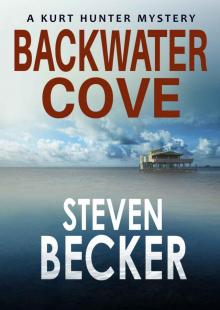 Backwater Cove
Backwater Cove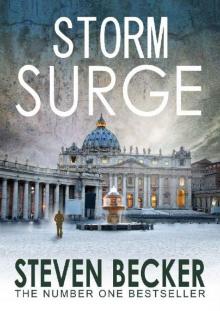 Storm Surge: A Fast Paced International Adventure Thriller (Storm Thriller Series Book 3)
Storm Surge: A Fast Paced International Adventure Thriller (Storm Thriller Series Book 3)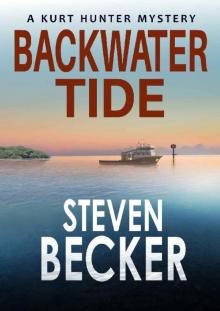 Backwater Tide
Backwater Tide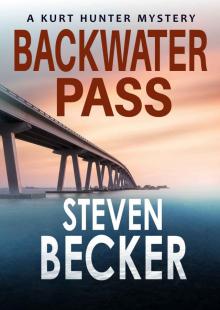 Backwater Pass
Backwater Pass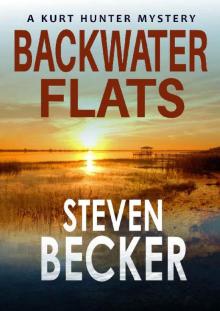 Backwater Flats
Backwater Flats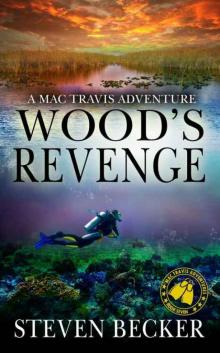 Wood's Revenge
Wood's Revenge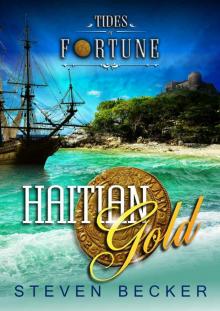 Haitian Gold
Haitian Gold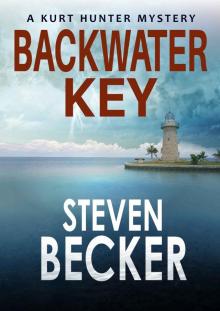 Backwater Key
Backwater Key Wood's Tempest
Wood's Tempest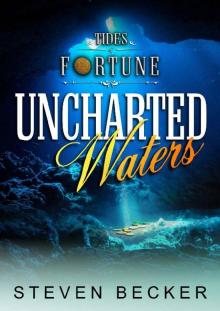 Uncharted Waters
Uncharted Waters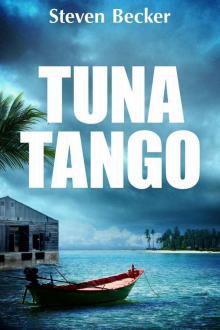 Tuna Tango
Tuna Tango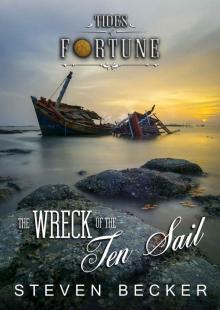 The Wreck of the Ten Sail
The Wreck of the Ten Sail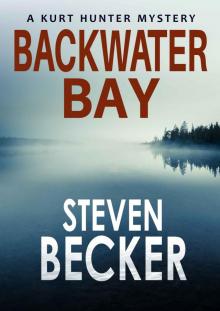 Backwater Bay (Kurt Hunter Mysteries Book 1)
Backwater Bay (Kurt Hunter Mysteries Book 1) Storm Clouds
Storm Clouds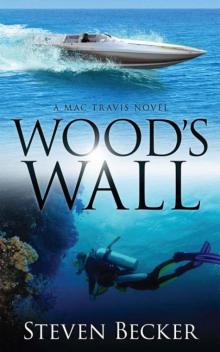 Wood's Wall
Wood's Wall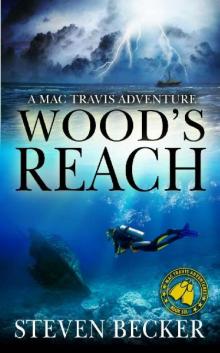 Wood's Reach
Wood's Reach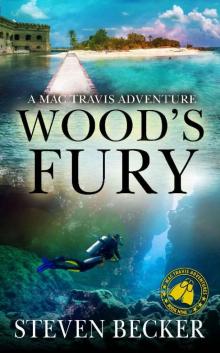 Wood's Fury
Wood's Fury Storm Rising
Storm Rising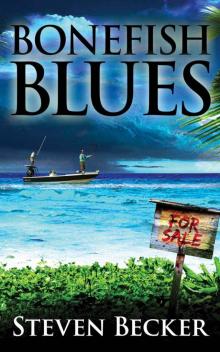 Bonefish Blues
Bonefish Blues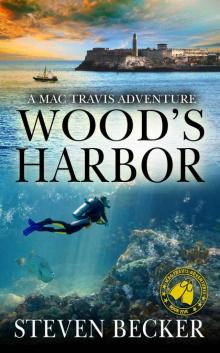 Wood's Harbor: Action & Sea Adventure in the Florida Keys (Mac Travis Adventures Book 5)
Wood's Harbor: Action & Sea Adventure in the Florida Keys (Mac Travis Adventures Book 5)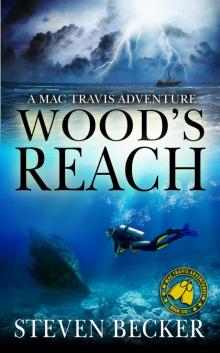 Wood's Reach: Action & Sea Adventure in the Florida Keys (Mac Travis Adventures Book 6)
Wood's Reach: Action & Sea Adventure in the Florida Keys (Mac Travis Adventures Book 6)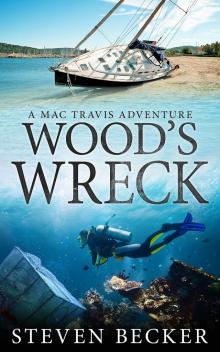 Wood's Wreck
Wood's Wreck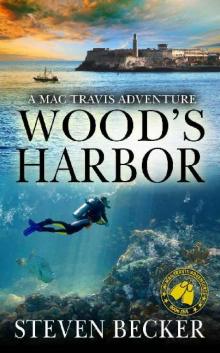 Wood's Harbor
Wood's Harbor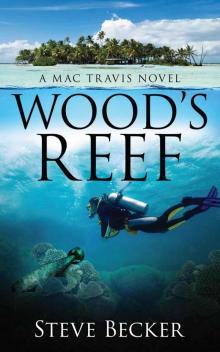 Wood's Reef
Wood's Reef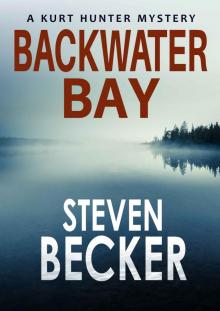 Backwater Bay
Backwater Bay